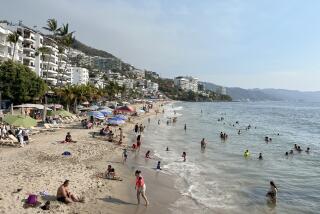Environmental groups to seek congressional help on clean-truck program
Only a month ago, officials at the nation’s busiest port complex believed the landmark clean-truck program -- a $1.8-billion strategy to slash toxic diesel emissions by phasing out 17,000 old, dirty big rigs -- had survived its toughest challenges and was on its way to becoming a model for green growth.
But many of the program’s key provisions were declared unconstitutional by a federal appeals court.
The ruling stunned a coalition of backers led by Los Angeles Mayor Antonio Villaraigosa, the Natural Resources Defense Council and the International Brotherhood of Teamsters.
Now, a week before a federal trial that will determine whether those provisions can be implemented, coalition leaders said they planned to seek congressional action -- regardless of what happens in court -- from potentially sympathetic lawmakers.
“If we lose the provisions, there won’t be much of a clean-trucks program left,” said Melissa Lin Perrella, a spokeswoman for the Natural Resources Defense Council. “So, Plan B is looking at legislative options.”
Nick Wiener, a campaign coordinator for Change to Win, a Washington-based labor organization, agreed.
“We need to talk to our friends in Congress and see what our options are,” he said. “We’ve come this far, and we are not going to give up because there are crummy laws.”
The coalition has yet to meet with any member of Congress on the matter.
But options under consideration include seeking an amendment to the Federal Aviation Administration Act, which prohibits governments from regulating price, route or service of a motor carrier.
The American Trucking Assn. cited that federal law in its request for an injunction halting implementation of the clean-truck program provisions.
Of particular concern is a new rule at the Port of Los Angeles that prohibits drivers from being independent contractors, a provision sought by Villaraigosa and the Teamsters.
The rule was designed to place the burden of buying and maintaining the new trucks on companies instead of low-paid drivers.
But some maritime experts think the efforts of environmentalists, union leaders and the Port of Los Angeles went too far in demanding concessions that force companies to employ the formerly independent owner operators.
“They tried to unionize the system, basically,” said Asaf Ashar, a research professor with the National Ports and Waterways Institute’s Washington, D.C., office, which is affiliated with the University of New Orleans.
A three-judge panel of the U.S. 9th Circuit Court of Appeals urged U.S. District Judge Christina Snyder to grant the trucking association’s request for an injunction halting implementation of that provision and others.
Snyder is expected to rule on the request April 27.
Meanwhile, the ports of Los Angeles and Long Beach and their smaller northern neighbor Port Hueneme on Tuesday became the last three ports in the nation to enforce a new ID card that everyone in the U.S. who has port business must show in order to get to work.
Port officials said the implementation of the federal Worker Identification Cards was launched smoothly, with cargo moving without delays.
David Freeman, president of the Los Angeles Board of Harbor Commissioners, offered a similar assessment of the 2-year-old clean-truck program, which he said was “far exceeding expectations.”
He declined to comment on talk of seeking help from Congress to preserve the controversial provisions.
As for the impending court trial, he said: “Sure, we’re concerned about possible injunctions on certain features of the program. But the heart of the program, which is to clean up the air, is already a roaring success.”
--
ron.white@latimes.com
More to Read
Start your day right
Sign up for Essential California for news, features and recommendations from the L.A. Times and beyond in your inbox six days a week.
You may occasionally receive promotional content from the Los Angeles Times.








